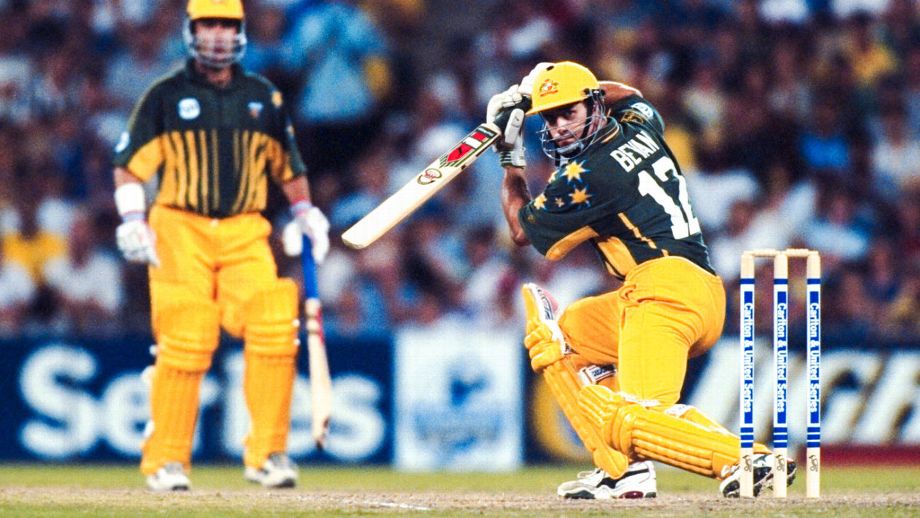The role of a finisher probably first originated with Bevan who scored 389 runs at an average of 194.50, bolstered by eight not-outs in ten innings during the 1995-96 Benson & Hedges World Series. The best knock in that series came against West Indies, on New Year’s Day at the SCG. Australia needed 173 in 43 overs and were struggling at 74 for 7 when Bevan orchestrated the kind of escape that would soon become his trademark, scoring an unbeaten 78 and hitting the winning boundary off the last ball, with the No. 11, Glenn McGrath, at the other end.
Bevan’s greatest innings, arguably, came in an unofficial ODI in April 2000. Chasing 321 against an Asia XI in Dhaka, the Rest of the World XI slipped to 196 for 7 in the 37th over Game over? Not while Bevan was still at the crease. With Andy Caddick providing support, Bevan somehow kept the RoW in the hunt, and brought the target down to 20 off the last over. What happened next? Well, watch the highlights of Bevan’s unbeaten 132-ball 185 here.
Bevan made six ODI hundreds, and his last one, against New Zealand in January 2002, was perhaps his best. All the familiar ingredients were there. Chasing 246 at the MCG, Australia slipped to 82 for 6, and then 143 for 7, and Bevan yet again had only the tail for company. But as always, he knew exactly which bowlers, and which areas of the field, to target. Watch his unbeaten 95-ball 102, and marvel at those meaty leg-side swats, and that lightning running between the wickets.
In the 2003 World Cup, England were on the verge of handing a seemingly invincible Australia side a rare defeat, reducing them to 135 for 8 in a chase of 205 in Port Elizabeth. But Bevan was still there, and so was Andy Bichel. Seemingly invincible? Scratch that.
The red-hot marauder
They both batted left-handed, and were both at their best in the late middle order, but their methods were chalk and cheese. Or fire and ice. Lance Klusener bludgeoned bowlers where Bevan manipulated them, but he was no less effective when you put a lost cause in front of him. Need 27 off 14 balls with just three wickets in hand, as South Africa did in Napier in March 1999? And then four off the last ball? No problem.
A few months later, Klusener produced one of the greatest individual displays at a World Cup. In a tournament characterised by low totals and seaming pitches, he scored 281 runs at an average of 140.50 (six not-outs in eight innings) and a strike rate of – wait for it – 122.17. Oh, and he took more wickets – 17 – than any other South African bowler. Against Sri Lanka in Northampton, he smashed 52 not out off 45 balls, including smacking 22 off Chaminda Vaas’ final over. In the Super Sixes against Pakistan, South Africa chased 221 with an over to spare despite middle-overs wobbles, thanks largely to Klusener’s 46 not out off 41 balls. Some of his leg-side hitting, as you can see here, was awe-inspiring, particularly a baseball-style six off Shoaib Akhtar. And you’ll remember the heartbreaking finish in the semi-final at Edgbaston, but don’t forget Klusener’s hitting in the lead-up. Just sensational.
In 2000-01, New Zealand toured South Africa and ended up on the wrong side of a 5-0 ODI whitewash. It might not have been so one-sided, though, had Klusener not been around to pull off a pair of ruthlessly explosive finishes in Durban and Cape Town.
“Finishes off in style!”
Has there been a better finisher than MS Dhoni at his peak? Could anyone better the audacity of his display in Lahore in 2006, when he arrived with India needing 99 off 92 balls, and proceeded to clatter an unbeaten 72 off just 46 balls? The second boundary in the video, off Abdul Razzaq, is particularly impressive: a controlled, one-handed lofted hit off a low full toss, placed calmly beyond the bowler’s reach. Later in the same series, in Karachi, India sent Dhoni in at No. 4 when they were miles behind the required rate and needed 146 to win off 118 balls. Tough ask? Yuvraj Singh and Dhoni only needed 99 balls to finish the job.
Dhoni’s most iconic finish, of course, came in the final of the 2011 World Cup, in Mumbai. You know how it ends, you know what Ravi Shastri says next, but you’ll definitely want to watch it again.
By this time, Dhoni was a far more calculating sort of finisher, a master of managing required rates while taking the fewest possible risks, and backing himself to produce the big hits at the climactic moments. A sample of this came in Adelaide in 2012, when he hit just one boundary in an unbeaten 44 off 58 balls – a monstrous, match-winning 112m six off Clint McKay, in the final over.
A year later, he sat out the league stage of a tri-series in the West Indies, returned for the final in Port-of-Spain, and finished the game in breathtaking fashion. With India needing 15 off the last five balls of a low-scoring thriller, Dhoni sent Shaminda Eranga crashing for 6, 4, 6.
LET US KNOW IF YOU ARE WATCHING MORE!

